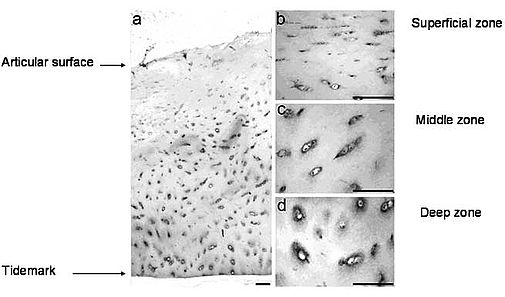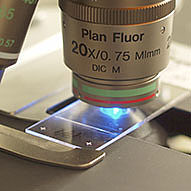
The melanocortin network in cartilage
![]()
Melanocortins (MCs) are structurally related peptides and are involved in processes such as food intake, energy homeostasis, sexual behaviour, endocrine gland function and inflammatory responses. The natural MCs, adrenocorticotrope hormone (ACTH) and the melanocyte-stimulating hormones (a-, ß-, y-MSH) derive from proopiomelanocortin (POMC), which is processed by distinct members of the prohormone convertase family. The effects of MSHs are transduced by melanocortin receptors (MC-R), a family of five transmembrane G-protein coupled proteins. The melanocortin system is a complex paracrine, endocrine and autocrine network, with well described functions in skin. The additional presence of MC-R on osteoblasts and chondrocytes suggest a role for the melanocortin system in skelettogenesis and bone and cartilage formation and, possibly endochondral ossification. Melanocortins are thought to play a role in longitudinal growth by increasing the height of the growth plate and tibial length in mice. alpha -MSH inhibits TNF induced MMP-13 expression in chondrosarcoma cells and thus may be an inhibitor of MMP-13 mediated collagen degradation. ACTH mediated activation of MC-R, expressed on knee joint macrophages, reduced Il-1ß and Il-6 release in experimental arthritis and inhibits neutrophil accumulation in the inflamed joint, thereby revealing anti-inflammatory potential. Despite these data, little is known about localisation, regulation, signal transduction and function of melanocortins in cartilage.
We have determined protein and gene expression of the MC-1R on articular chondrocytes derived from osteoarthritic cartilage. In vitro application of a -MSH altered gene expression of collagens, MMPs, interleukins and Sox9 in a differentiation depended pattern in articular chondrocytes kept in micromass pellet culture. In general, at an early culture time point a- MSH induced a downregulation of these genes while at a later time point they become upregulated. This time dependent induction / suppression pattern points to a differentiation specific involvement of alpha- MSH in processes like endochondral ossification as a factor with possibly trophic functions. The regulation of cytokines and MMPs hint towards a role in modulation of inflammatory or degenerative processes in diseases as Rheumatoid Arthritis and Osteoarthritis.
MC- receptors signal primarily by coupling to the heterotrimeric Gs protein, thus triggering the adenylate cyclase pathway resulting in an increase in cAMP level. However, MC-R may also activate the inositol triphosphate and Ca 2+ - signalling pathway dependent on the cell type. For chondrocytes the inositol triphosphate / Ca 2+ signalling system appears to be the more important since binding of alpha -MSH to its receptor triggers only a moderate increase of cAMP level.
Future experiments aim to unravel the major signal transduction pathway of alpha -MSH in chondrocytes and its fundamental role in cartilage homeostasis and metabolism.

MC-1R immunoreactivity in articular chondrocytes in situ
Chondrocytes stained for immunoreactivity of MC-1R in cryostat sections of articular cartilage. The articular surface is marked at the top of the picture (a). Staining for MC-1R was detected in all cells of the middle (c) and deep zones (d) of the articular cartilage, whereas markedly reduced or no staining was observed in the superficial zone (b). Sections incubated without the primary antibody or with pre-immune serum served as a negative control. No sections showed any staining in such control experiments (data not shown).
N = 3; bar = 100µm.
Investigators
1. Markus Böhm , Prof. Dr. med , Dept. of Dermatology und Venerology,
University Hospital of Münster
2. Susanne Grässel, Prof. Dr. rer. nat., Julia Kaps, Dr. rer. nat., Gerit Hackmayer. Cand. Dr. med. vet., Johannes Beckmann, PD Dr. med.; Clemens Baier, Dr. med., Dept. of Orthopaedics,
University Hospital Regensburg

